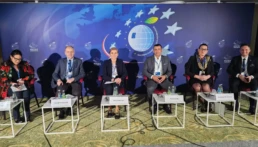Summary of the 9th European Congress of Local Governments Economic Forum
On 4-5 March 2024, Mikolajki hosted the IX European Congress of Local Governments. The event, on behalf of Interzero, was attended by Pawel Lesiak, Vice President of the Management Board. The theme of this year's edition was 'The future of the idea of decentralisation in a changing world'.
Technological development, social change and challenges
Local government reforms have brought decades of successful economic growth and regional development to Europe. The self-government reform in the Third Republic is considered one of the best, enabling the effective absorption of EU funds, participation in cross-border programmes and the implementation of strategic regional projects.
However, severe turbulence, both in Poland and across Europe, has had a negative impact on the decentralisation of power in recent years. The pandemic caused a sudden break in supply chains, which undermined the idea of borderless globalisation, leading to consolidation and centralisation of power. This edition focused on building a vision of an effective, modern and proactive local government. There were also topics related to environmental protection and recycling.
The deposit system as a positive example of recycling
In the panel discussion "Returning plastic bottles on deposit - positive examples of recycling". attended:
- Paweł Lesiak - Vice-President of the Management Board, Interzero Organizacja Odzysku Opakowań S.A.
- Katarzyna Michniewska - President of the Management Board, Eko Cykl Organizacja Odzysku Opakowań S.A.
- Konrad Nowakowski - President, Polish Chamber of Packaging Recycling and Recovery
- Anita Palukiewicz - Partner, SSW Pragmatic Solutions
- Jakub Sprusiński - Director of Product Development and Sales, T-MASTER S.A..
The discussion was moderated by Agnieszka Sznyk, CEO, INNOWO.

In 2025, the obligation to collect plastic bottles will be 77% and the target is 90% from 2029. This is a requirement under the provisions of the SUP Directive. Achieving such high levels will only be possible by deposit system - Currently, around 45% of plastic bottles are collected. In 2025 we will therefore be short of 32%. The bailing systems in 2025 will only be taking off, so getting to full efficiency will be staggered.
Are the planned collection levels realistic to achieve?
However, this does not mean that the 2025 level is at risk. The deposit will significantly affect the propensity to return packaging. An example of this is aluminium cans, which are currently collected at levels in excess of 70% despite the lack of a deposit and a universal collection system. However, the value of the raw material (around £5 per 1kg) encourages collection and transfer to collection points. Approximately 55 cans come in at 1kg, meaning that handing over a can to a collection point yields about 2 gr per can. With a deposit rate of at least 50 gr, collection levels will certainly not be lower than at present. Similarly high levels will also be achievable for plastic bottles.
The collection of bottles in a deposit system will allow this waste to be separated from other waste to ensure the quality required for the production of recyclate for food contact packaging. In 2025, the required level of recyclate in plastic bottles will be 25% and in 2030. 30%.
The PPWR stipulates that the proportion of recyclate in bottles will increase to 65% by 2040. The PPWR assumes that from 2030 there will be a required level of recyclate in all plastic packaging. In 2025, EU regulations require a 50% and in 2030 a 55% recycling level for plastic packaging waste. PPWR assumes that the European Commission may propose more ambitious recycling targets, including for plastics.
Necessary statutory changes
The removal of plastic bottles from the municipal waste stream will reduce the revenue of municipalities from the sale of this waste collected from residents. It is therefore necessary to quickly introduce ROP provisions adapted to the new requirements of the Waste Directive, which will increase business participation in financing the costs of waste collection in municipalities.
The amendments to the bail regulations signalled by the Ministry may not introduce revolutionary changes that would shatter the assumptions adopted in the Act for its operation. Nevertheless, several changes are necessary to improve its functioning in the future, e.g. the creation of an umbrella organisation that will, among other things, centrally account for the bail collected and returned.
It is also necessary to allow cans and bottles that are waste to be transported from shops by vehicles that deliver products to shops (amendments to the Waste Act). This will reduce the amount of packaging collected from shops, which will reduce the carbon footprint.
Also important is the demand to use the commercial infrastructure to store or sort collected packaging without having to obtain a waste collection permit granted through a lengthy administrative procedure.
You can read more about Interzero's role in the Polish bail system by reading HERE
Check out our range of recyclers HERE
